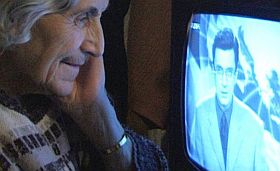


Storydoc/3

There were three inspirational lectures at the workshop in Corfu.
Louise Rosen, American (from her cv) ”media executive in the international television and film business, project development, production and distribution”, talked precisely and inviting about meeting the audience and urged the filmmakers to use promotion tools like YouTube, vimeo, facebook, twitter etc.
Commissioning editor Iikka Vehkalahti, YLE Finland, was asked to give the audience ”five reasons to be optimistic about the future of the documentary”. He started his speech by doing the opposite naming five obstructions: the decline of the relationship between tv and documentaries, the lack of financing (”the golden age of copro is over”), the cinematic quality is worse than ever, the monocultural perspective reigns, as does the predictability of most films. This total deconstruction was then followed by the positive mention of the many current platforms where you can launch your film, from festivals (which he compared to art exhibitions) to webdoc and vod. Vehkalahti, who always has a very special, unconventional take on his listeners, and has many times been credited on this site for his pioneer work with ”Steps for the Future”, ended by showing two exceptional clips, one from a rough cut of a film from Chechnya, and one from the new Finnish documentary hit, ”Steam of Life” (review will follow).
”Who can bear to feel himself forgotten” is a legendary line from ”Night Mail” the documentary classic from 1936, a film that is famous for using poetry – written by W.H. Auden. Peter Symes, filmmaker and editor and teacher, had his lecture focus on this subject, ”Poetry in Documentaries”, himself being the one, who used it in several films, where he worked with the poet Tony Harrison. Symes stated that you can ”say the unsayable” through poetry, which was exactly what he had been doing with Harrison in the films ”Mimmo Perella” (funeral rituals in southern Italy) and ”Hiroshima”. When he was at BBC, Symes set up ”Poets’ News”, which was great to watch clips from, as was (great) the session with Symes on films where ”the poet will come to work as a commentator”.
Photo: “The Box”, great Greek documentary, by Eva Stefani, one of the tutors at Storydoc in Corfu.